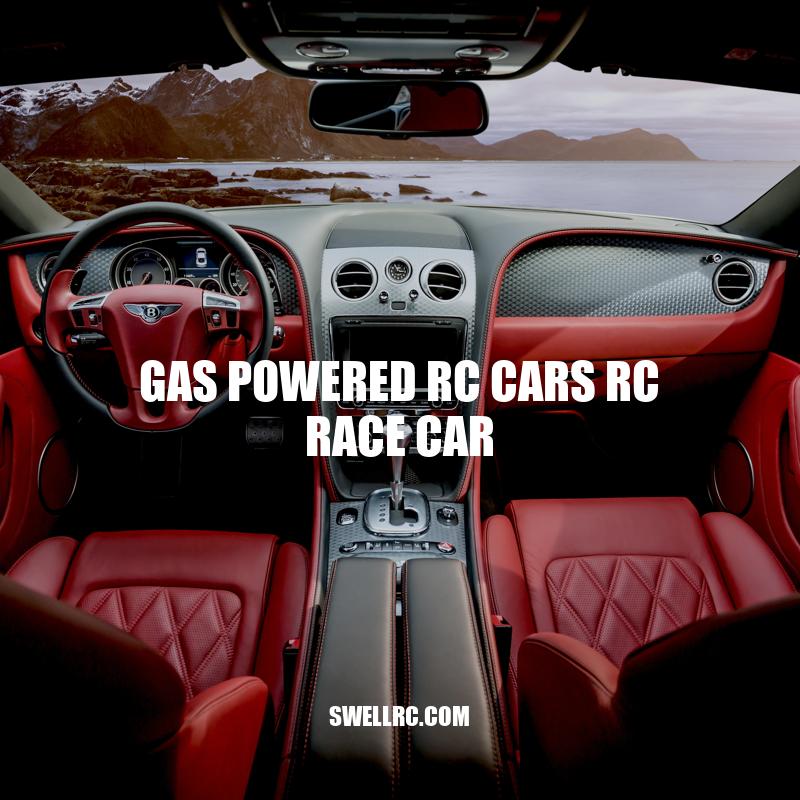Gas-Powered RC Race Cars: The Ultimate Racing Experience
Gas-Powered RC Cars: Everything You Need to Know About RC Race Cars
Remote Control (RC) cars have always been popular among enthusiasts, providing a sense of power and control while racing miniature cars at high speeds. Gas-powered RC cars, in particular, have gained immense popularity in recent years due to their power and speed, making them a top choice for serious racers and hobbyists alike. RC cars are often seen as expensive toys, but they are more than that: they are miniature works of art that require technical skill and a deep understanding of physics and mechanics. The thrill of racing RC cars is more than just a pastime—it’s an entire community of folks who are passionate about these small, high-speed vehicles. In this article, we’ll dive into the world of gas-powered RC cars and RC racing to give you an in-depth look at what makes these miniature cars so exciting, how they work, and what it takes to master them as a hobby or sport.
The Benefits of Gas-Powered RC Cars
One of the biggest advantages of gas-powered RC cars is the speed and power they offer. Here are some other benefits to consider:
- Long run times compared to electric RC cars.
- More realistic engine sounds compared to nitro-powered cars.
- Minimal startup time and quick refueling times make for short pitstops.
- Broader range of engine sizes allow for personalization and tuning based on ability and skill level.
Gas-powered RC cars require specialized fuel and maintenance but provide an authentic driving experience as well as longer run times. If you are interested in maintaining and tuning your RC car, gas-powered models may be worth considering. Numerous websites offer guides, tutorials, and instructional videos to help you get started. Some of these include
RC Car Action,
RC Driver, and
RC Universe.
Certain models of gas-powered RC cars to consider for rc racing include the Traxxas Nitro Slash, HPI Racing Trophy, and Losi 8IGHT-T Nitro 1/8 4WD RTR.
What is better gas or electric RC cars?
Gas and electric RC cars each have their pros and cons. Here are some things to consider:
| Gas RC Cars | Electric RC Cars |
| — | — |
| Pros: | Pros: |
| More power and speed | Quieter and cleaner |
| Longer run time | Easier to maintain |
| More realistic engine sound and exhaust | Less expensive to operate |
| Cons: | Cons: |
| Requires more maintenance | Limited run time per battery charge |
| Messier to operate | Limited power and speed |
| More expensive upfront cost | Less realistic sound and exhaust |
Ultimately, the choice between gas and electric RC cars depends on personal preference and usage. This article from RC Geeks compares the two types and offers helpful tips for choosing the best option for you.
Alternatively, here are a few RC cars which you can look up:
- Traxxas Slash 4X4 Gas Powered RC Truck
- Redcat Racing Electric Tornado EPX PRO
- ARRMA 1/8 KRATON 6S V5 4WD BLX
Types of Gas Powered RC Race Cars
RC race cars come in various shapes and sizes to suit different types of racing. Here are some common types of gas powered RC race cars:
- Touring cars
- Drift cars
- Off-road buggies
- Short course trucks
Each type of gas powered RC race car is designed for specific racing environments and comes with its own set of challenges and expertise. The following table provides an overview of the different types of gas powered RC race cars:
| Type of RC Race Car | Features | Best for |
|---|---|---|
| Touring Cars | Low profile tires, adjustable suspension, and aerodynamics for speed, handling, and stability. | On-road racing circuits |
| Drift Cars | Slick tires, rear-wheel drive, and specialized suspension for drifting, braking and cornering. | Drift racing circuits |
| Off-road Buggies | High clearance, large tires, and long shock absorbers for rough terrain and jumps | Off-road tracks and dirt racing courses |
| Short Course Trucks | Large tires, adjustable suspension, and sturdy chassis for navigating lots of jumps and rough terrain. | Small and challenging tracks |
Most types of gas powered RC race cars can be powered by gas engines, and they often require specialized equipment and gear for optimal racing. Online forums and RC car clubs can be useful resources for discovering more information on specific racing types and their required experts.
For those interested in gas powered RC race cars, there are many brands to choose from. Brands such as Traxxas and HPI Racing offer a variety of high-performance gas powered RC race cars that are suitable for beginners and experienced drivers. Additionally, online retailers such as Amain Hobbies and Horizon Hobby offer a wide selection of gas powered RC race cars and parts to help drivers improve their performance and keep their cars running smoothly.
What are all the different types of RC cars?
There are several different types of RC cars, including:
- On-road cars: Designed for high-speed racing on smooth surfaces like pavement and indoor tracks.
- Off-road buggies: Have large tires and high ground clearance, suitable for racing on rough terrain and outdoor tracks.
- Crawlers: Slow-moving vehicles with large, grippy tires designed to traverse rough, rocky terrain.
- Drift cars: Rear-wheel drive cars designed to slide around corners and perform drifting maneuvers.
- Monster trucks: Large, rugged vehicles with oversized tires and suspension systems capable of jumping and climbing over obstacles.
There are also different variations within each type, such as different body styles and motor configurations. Check out websites like Horizon Hobby or Tower Hobbies for a wide selection of RC cars and accessories.
Gas-Powered RC Race Cars
RC racing with gas-powered cars requires more tuning and maintenance compared to other types of RC cars. Here are some challenges and reasons why gas-powered RC cars make for great racers:
- Gas-powered RC cars are typically faster than electric or nitro-powered cars.
- They are also more durable, making them ideal for intense racing.
- Gas-powered RC cars have longer run times than nitro or electric RCs, ensuring that they last throughout the race.
However, there are also some challenges when racing with gas-powered RC cars:
- They require more care and maintenance than other types of RC cars. Tune-ups are required regularly to keep the engine running at its best.
- Gas will also be needed for refueling the car, which can be more expensive than the other fuel types used.
Despite these challenges, gas-powered RC cars remain a popular choice for many racers because of their speed, durability, and long run times. It is also essential to tune the engine and suspension settings to maximize performance and speed.
There are plenty of resources and online stores that offer tuning parts and other gear for the gas-powered RC racing enthusiast. Some examples include:
- A Main Hobbies
- Redcat Racing
- RC Planet
Are gas powered RC cars faster?
Gas powered RC cars are usually faster than their electric counterparts due to the higher power output of gas engines. In addition to speed, gas cars often have longer run times and require less maintenance than electric cars. However, gas cars may be heavier and more difficult to control, especially for beginners.
For more information on gas powered RC cars, you can visit websites such as horizonhobby.com or towerhobbies.com which offer a variety of gas RC cars and accessories.
When it comes to selecting the perfect gas-powered RC car for racing, there are several factors to consider. Here are some tips to help you make an informed decision:
- Size: The size of the RC car is a crucial factor when selecting a gas-powered RC car for racing. Consider the track size and type of racing that you plan to participate in.
- Budget: Gas-powered RC cars can be expensive. Determine your budget, including not just the cost of the car but also the cost of fuel, spare parts, and accessories.
- Brand: Some brands, such as Traxxas and Redcat Racing, are well-known for producing reliable gas-powered RC cars for racing.
- Reviews: Do your research by reading online reviews of gas-powered RC cars before making a purchase. Check out websites such as Amazon or RC forums – such as RC Groups and RC Universe – to get an idea of which cars are popular and recommended.
- Racing Class: There are different classes of racing based on car specification, including engine size, tire type, and chassis type. Research which class of racing you plan to participate in and ensure that the gas-powered RC car you are considering is suitable.
There are many online retailers where you can purchase gas-powered RC cars for racing. Here are some popular options:
| Retailer | Location | Website |
|---|---|---|
| A Main Hobbies | California, USA | https://www.amainhobbies.com/ |
| Tower Hobbies | Illinois, USA | https://www.towerhobbies.com/ |
| Horizon Hobby | Illinois, USA | https://www.horizonhobby.com/ |
How to choose a RC car?
To choose a RC car, consider the following factors:
| Factor | Description |
|---|---|
| Power Source | Decide if you want an electric or nitro-powered RC car. Electric cars are cheaper and quieter, while nitro-powered cars are faster and require more maintenance. |
| Scale | Consider the size of the RC car, which is measured by its scale. Popular scales include 1:10 and 1:18. |
| Chassis Type | Choose the type of chassis you want, such as on-road or off-road, which determines where you can use the car. |
| Brand and Model | Read reviews and choose a reputable brand and model that fits your preferences and budget. |
Some helpful websites for finding RC cars include:
- https://www.horizonhobby.com/ – offers a wide selection of RC cars
- https://www.amainhobbies.com/ – provides a large variety of brands and models
- https://www.towerhobbies.com/ – offers deals on RC cars
Racing Events and Competition
Gas-powered RC cars can be an exciting way to test your skills and compete against others in RC races. Here are some things to consider when participating in RC races:
- Types of Racing: There are many types of RC racing, including touring car, off-road buggy, and oval racing.
- Local Club Races: Many local RC clubs host their own races. Check online groups or visit your local hobby store to find a racing club near you.
- National Championships: If you have achieved proficiency in RC racing, consider participating in national championships. These competitions bring together some of the best racers from around the country.
- Sportsmanship: RC racing is meant to be fun and competitive. Good sportsmanship, including respecting other racers and their equipment, is essential to the RC racing community.
- Preparation: Before participating in a race, be sure to prepare your gas-powered RC car. Tune up the engine, check tire pressure, and make any necessary repairs to ensure optimal performance during the race.
If you are interested in getting involved in RC racing, there are several resources available to help you get started. Check out websites such as:
These websites provide information on local clubs, upcoming races, and reviews of gas-powered RC cars suitable for racing. You can also check out online retailers, such as HobbyTron and Horizon Hobby, for racing parts and accessories such as wheels and tires that give you an edge in competitions.
What should I look for in a RC car?
When looking for a Remote Control (RC) car, there are a few things that you should consider:
- Type of RC car: There are different types of RC cars such as on-road, off-road, drift, rock crawler, etc. Choose the one that suits your usage.
- Size: RC cars come in various sizes. Choose the one that fits your budget and needs.
- Speed: Determine how fast you want your car to go. Speeds can range from 10 mph for beginners to over 60 mph for advanced users.
- Control Range: Make sure the RC car you purchase has a control range that suits your needs. Some cars have a range of up to 1000 feet, while others have a shorter range.
- Battery Life: Check the battery life of the car to avoid sudden power loss during use. Ensure you purchase a car with long battery life or replaceable batteries.
- Price: Consider your budget when buying an RC car. Prices can range from under $50 to over $1000. Determine the features you need most and buy something within your budget.
You may check websites like Amazon, Hobbytron and NitroRCX for various types of RC cars along with their specifications and customer reviews.
Conclusion
In conclusion, gas-powered RC cars and RC racing offer a fun and exciting hobby for enthusiasts of all skill levels. The power and speed of gas-powered cars, combined with the competition of racing, provide a unique experience that draws in hobbyists and serious racers alike.
If you’re interested in getting started, take some time to research different types of gas-powered RC cars and determine which is best suited to your needs and budget. Consider joining a local RC racing club or attending events to gain experience and connect with other racers.
Remember to practice good sportsmanship and respect fellow racers and their equipment. With preparation and practice, you can take your gas-powered RC car to the next level, whether it’s for casual racing or national championships.
Overall, gas-powered RC cars and RC racing offer an opportunity to explore a unique hobby that provides endless hours of entertainment and excitement. So why not give it a try and see where it takes you?



